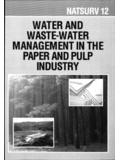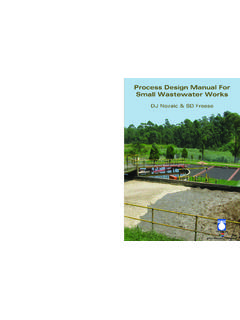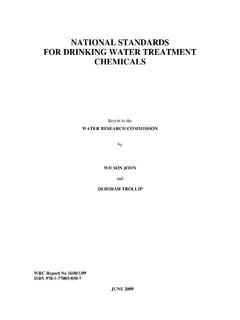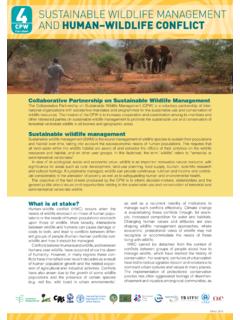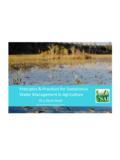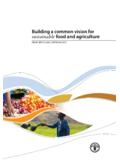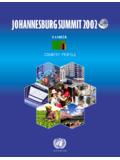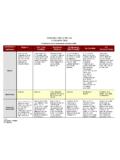Transcription of Alternative Technology for Stormwater …
1 TT 558/13 Alternative Technology for Stormwater ManagementThe South African Guidelines for sustainable Drainage SystemsNeil Armitage, Michael Vice, Lloyd Fisher-Jeffes, Kevin Winter, Andrew Spiegel & Jessica DunstanTT 558/13 Guidelines for sustainable Drainage Systems Alternative Technology for Stormwater management The South African Guidelines for sustainable Drainage Systems Neil Armitage, Michael Vice, Lloyd Fisher-Jeffes, Kevin Winter Andrew Spiegel & Jessica Dunstan Report to the Water Research Commission by University of Cape Town WRC Report No. TT 558/13 May 2013 ii Obtainable from Water Research Commission Private Bag X03 GEZINA 0031 or download from The publication of this report emanates from a project titled Alternative Technology for Stormwater management (WRC Project No.)
2 K 5/1826) This report forms part of a series of two reports. The other report is Alternative Technology for Stormwater management : Report and South African Case Studies (WRC Report No. 1826/1/13 DISCLAIMER This report has been reviewed by the Water Research Commission (WRC) and approved for publication. Approval does not signify that the contents necessarily reflect the views and policies of the WRC nor does mention of trade names or commercial products constitute endorsement or recommendation for use. ISBN 978-1-4312-0413-7 Printed in the Republic of South Africa WATER RESEARCH COMMISSION iii Executive summary Background Stormwater management in the urban areas of South Africa has and continues to predominantly focus on collecting runoff and channelling it to the nearest watercourse.
3 This means that Stormwater drainage currently prioritises quantity (flow) management with little or no emphasis on the preservation of the environment. The result has been a significant impact on the environment through the resulting erosion, siltation and pollution. An Alternative approach is to consider Stormwater as part of the urban water cycle, a strategy which is being increasingly known as Water Sensitive Urban Design (WSUD) with the Stormwater management component being known as sustainable Drainage Systems (SuDS). SuDS attempts to manage surface water drainage systems holistically in line with the ideals of sustainable development.
4 It aims to design for water quantity management , water quality treatment, enhanced amenity, and the maintenance of biodiversity. In so doing many of the negative environmental impacts of Stormwater are mitigated and some benefits may in fact be realised. Objectives and aims This study had the following three aims: i) To identify and develop new and appropriate, practical and affordable Alternative Stormwater management technologies for South Africa in line with Water Sensitive Urban Design (WSUD) principles. ii) To evaluate the identified Technology options in terms of their ability to improve Stormwater management in urban areas; reduce the impacts on receiving watercourses resulting from increased velocities and volumes of runoff and the deterioration of runoff quality.
5 Iii) To develop practical and user-friendly guidelines for the implementation of WSUD for both retrofit and greenfield scenarios in both the economic and sub-economic sectors of South African society. Methodology Literature review An extensive search was undertaken to uncover all that had been published on sustainable Drainage Systems since 2000. The information obtained, which included books, journal papers, conference proceedings, reports and manuals, was used to compile a 405-page bibliography. The bibliography was in turn used to compile a summary Literature Review (in the research report) as well as these South African Guidelines for sustainable Drainage iv Systems hereafter referred to as the South African SuDS Guidelines, or simply the Guidelines South African case studies At the beginning of the research, a number of exploratory field trips were undertaken to assess what had been planned and implemented in South Africa with respect to SuDS.
6 Although the case studies were limited to only three provinces (Western Cape, Gauteng, KwaZulu-Natal), these three provinces account for approximately half the population and the majority of the economic activity of South Africa. They also experience different climatic conditions from each other that roughly represent much of the country. The identified case studies were then monitored over a two year period. The eight most promising case studies were selected for further study and reporting. The wetlands and associated SuDS at Century City in Cape Town were studied in particular detail.
7 The monitoring of these case studies did not include instrumentation or measurements of the quality or quantity outcomes of the systems, except in the case of Century City where monitoring had been undertaken by the landowner association. The development of the South African SuDS Guidelines In the course of the search for source material, 27 SuDS design manuals from Australia, the United Kingdom and the United States were reviewed. The South African SuDS Guidelines were then compiled by summarising the key material from these manuals in such a way as to be relevant to all professionals working with Stormwater and not just engineers.
8 The Guidelines are not intended to be a design manual but a way of highlighting potential opportunities for better Stormwater management . Initially the draft Guidelines together with supplementary material was compiled on a DVD and given out to delegates attending workshops in Cape Town, Johannesburg, Centurion, George and Durban. The feedback from these workshops was incorporated into the final SuDS Guidelines along with a number of further refinements. The SuDS Economic Model (SEM) The SuDS Economic Model (SEM) comprises Excel macro-enabled software that was developed to assist in the economic analysis of Alternative approaches to Stormwater management .
9 The functioning of the model is described in Appendices D-G in the SuDS Guidelines. The SuDS / WSUD Website Initially it was envisaged that the outputs from this research project would be distributed on a DVD. This approach initially proved successful, but a number of shortcomings became v evident including the fact that: it was not possible to get copyright clearance for all resources; it is difficult to update; and a DVD requires practitioners to have a DVD drive to access the information. As a result a decision was made to develop a website which could in time be expanded to cover other issues associated with WSUD.
10 This approach has a number of advantages: it is possible to link references to their sources; it is possible to continuously update material and correct any errors; and it is possible to collect data on new SuDS projects from the professionals involved. The resulting website can be found at the following address: Project deliverables This study set out to identify and develop new and appropriate guidelines for the use of Alternative Stormwater Technology in South Africa. The project resulted in the development of the following deliverables: sustainable Drainage Systems report and South African case studies.

